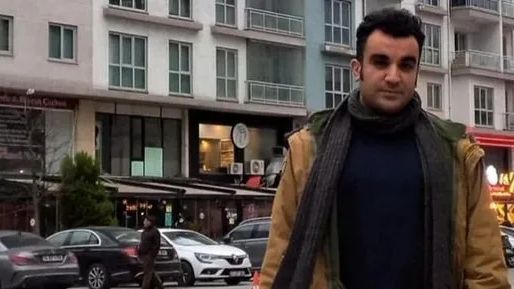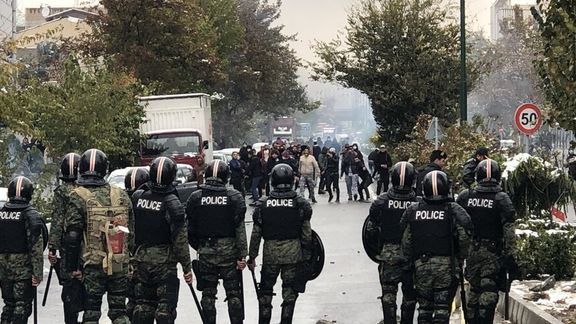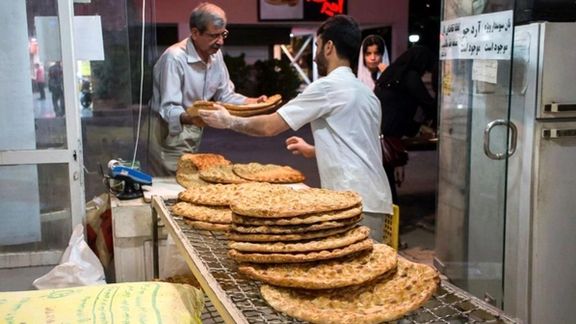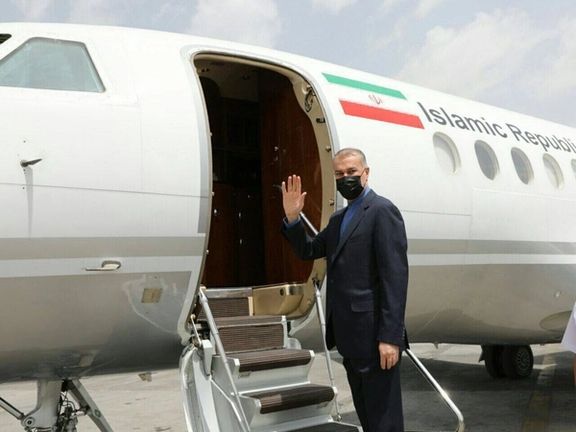Fears Grow As Turkey Deports Iranian Dissidents

The Turkish government is facing criticism for its treatment of Iranian dissidents seeking political asylum in this country.

The Turkish government is facing criticism for its treatment of Iranian dissidents seeking political asylum in this country.
The recent arrest of Mohammad Lahmi, a former airline pilot and a cleric who fled from Iran in 2022, has highlighted the growing apprehension among activists.
His prosecution and arrest is said to have stemmed from a business dispute involving influential businessmen closely linked to the Revolutionary Guards.
Lahmi had sought refuge in Turkey to escape persecution by the Iranian regime, but even while residing in Turkey, he continued to criticize the Iranian government through his social media platform.
Activists argue that since the Iranian regime provided political support to President Recep Tayyip Erdogan's government following a failed coup in 2016, Turkey's willingness to shelter Iranian dissidents has diminished. This has led to an increase in deportations back to Iran, where dissidents fear for their safety and well-being.
In December 2019, two Iranian protesters, Mohammad Rajabi, 25, and Saeed Tamjidi, 27, faced a high-profile case when they were arrested and deported to Iran. Turkish police handed them over to Iranian authorities, leading to their transfer to Evin prison.
Despite their death sentences being rejected in appeal courts, they were imprisoned for several years, along with another protester, following several months of detention.
Adding to the growing concern, reports have emerged of another Iranian political activist, Shahriar Baratinia, being deported from Turkey to Iran on Thursday.
Baratinia, a former political prisoner who had been residing in Turkey without a residence permit, faces potential danger upon his return to Iran, according to human rights website Hirman.
Human rights groups are closely monitoring the situation, calling on Turkey to reconsider its approach towards Iranian dissidents.

In a video that has gone viral on Iranian social media this week, well-known economist Mohsen Renani says the clerical regime in Iran cannot survive.
Reani said in the video that the regime cannot survive because its foundations are rotten and have been devoured by termites. He added that “the elite have left the country’s administrative system,” echoing others who have pointed out how the hardliners have put incompetent people in critical government position.
Renani, an economist and an outspoken critic of the Iranian political system has warned several times about the collapse of the regime following the nationwide protests in the fall of 2022 and 2023, which posed the most serious threat to the regime since its inception in 1979.
Earlier, when the government reached out to him to help draft the country’s 7th Development Plan, he refused to cooperate and said that Iran’s economy was beyond rescue.
Renani argued in his latest video that you cannot solve the country’s problems using the same school of thought that created the problems in the first place. He added: “This political system has created several crises for the country with its underlying principles. So, it cannot resolve those crises using the same principles.”

He reiterated that the Islamic Republic has already crossed the point when it would have been possible to solve systemic problems. Now the regime needs big decisions. So, it cannot survive with this style of management and the way its leaders steer the country.”
“It cannot survive unless it makes big decisions, changes the rails on which it is moving, goes about a paradigm shift and starts a revolution from the top,” said Renani. “The regime needs to bring about changes that the people say, this was what we wanted.”
There won’t be a quiet social revolution in Iran. If there is ever another revolution, it is likely to be an urban revolution,” he said, explaining that “Urban revolutions happen like a sudden strike that knocks out the establishment.”
Using an analogy from soccer, Renani likened protests since 2018 including the 2022 uprising as “preparatory games.” The real revolution he argued would a different ball game.
The outspoken critic had warned Khamenei in a letter he published on social media in February that “the Islamic Republic is in the final stage of its downfall.” In the same letter, Renani also warned Khamenei that “a revolution in Iran is inevitable under these circumstances.”
In July, Hossein Valeh, a sociologist who can be considered a regime insider, had also warned the government that the gap between the people and the government that gave rise to the 2022 uprising still exist and have widened further.
Valeh stated in an interview with Roiuydad24: "When the government is perceived as a stranger, the society cannot tolerate its shortcomings." He explained that the reason for this is that the government has never tried enough to be all-inclusive. "The government has widened the gap between itself and the nation instead of trying to fill it."
Following the government’s renewed crackdown on women who defy the compulsory hijab, sociologist Ahmad Bokharaei warned that polarity created by the government and restrictions it imposes on its citizens can eventually lead to social upheavals and even armed clashes.

As bread prices soar in 13 provinces, Iranians are being forced to purchase only half a loaf of bread due to the steep cost in an unprecedented trend.
Low-income workers in particular are feeling the brunt of the price surge with bread being consumed as part of two or three daily meals. This sharp increase in bread prices could potentially trigger an inflationary shock.
Iran's state television confirmed the price hike in the staple food on Thursday after weeks of contradictory statements from officials. Previous denials regarding the government's intention to increase bread prices have now been overshadowed by the reality of rising costs.
Following subsidy reforms in May last year, Minister of Economy, Ehsan Khandouzi, had explicitly stated that an increase in bread prices was a "red line" set by the President, with other officials echoing the sentiment. However, despite these assurances, bread prices have witnessed an increase in several provinces, risking fueling social unrest further.
In an interview with ILNA news agency, labor activist Framarz Tofighi pointed out that the high prices are not limited to bread alone. “Dairy products have vanished from workers' tables, rice has become unaffordable for many, and even sugar has seen significant price spikes,” he said.
Bakery workers are also suffering the consequences of the rising bread prices, questioning why they and the general public should bear the burden of increased bakery costs as they suffer surges in rent, taxes, and energy bills that remain unaddressed.
Currently the official annual inflation rate is 47.5 percent – the highest rate in Iran for more than 30 years -- but prices for food are most affected, with the price of cooking oil rising by more than three times annual inflation at 145 percent, and the price of meat also rising by 78 percent over a one year period (point-to-point), while around 60 percent of Iranians now forced below the poverty line.

Iran's Foreign Minister Hossein Amir-Abdollahian will visit Japan Sunday and meet his Japanese counterpart and Japan's Prime Minister Fumio Kishida.
Japan will tell Iran to stop weapon supplies to Russia at Amir-Abdollahian's Tokyo visit, Tokyo Broadcasting System said, citing multiple unnamed government officials.
Iran has supplied hundreds of kamikaze drones to Russia that have been extensively used against civilian and infrastructure targets in Ukraine. The United States and its NATO allies have urged Tehran to stop its military support for Moscow and have imposed a series of sanctions on entities and individuals involved in the drone program.
The main purpose of Amir-Abdollahian’s trip to Tokyo is not clear, as Iran is generally isolated by the United States and its allies. Japan owes Iran around $3 billion, which are funds frozen due to US sanctions. Amir- Abdollahian most likely raise the issue of the funds, as Tehran is also pressuring South Korea to release $7 billion frozen by two Seoul banks.
Amir-Abdollahian who was visiting Pakistan on Thursday called on the US and Europe to stop supplying weapons to Ukraine.
The government media in Tehran has displayed clear support for Russia since the invasion of Ukraine began and the government and its officials have never condemned Moscow’s attacks on civilians.

The leader of Canada's New Democratic Party (NDP) has called for investigations into potential election interference by Russia, India, Iran, and China.
The impetus for the talks stemmed from media reports earlier in the year, which alleged attempts by China to interfere in the last two federal elections. However, parties across the spectrum reached a consensus that such interference did not impact the outcomes of the elections.
Over the summer, house leaders from various federal parties have been engaging in discussions to determine the terms and timeline for the proposed inquiry.
Jagmeet Singh said on Thursday, "We have been pushing to say that a public inquiry should include all countries that are in a significant way trying to interfere in our democracy".
However, there has been resistance to the inquiry, and though Singh did not explicitly mention the specific parties resisting the inquiry's expansion, it was disclosed in late May that the Liberals voted against the motion.
The issue of foreign countries' involvement in Canada has sparked a contentious debate within the country's political landscape and government. Former special rapporteur David Johnston's resignation was triggered by these diverging perspectives as he criticized the Liberal government's handling of information pertaining to foreign agents.
Interventions by Russia, China, and the Islamic Republic in Western countries have previously been subjects of discussion, with American and European politicians also raising alarms over efforts by the Islamic Republic to influence voting processes in their respective nations.

The Iranian city of Mashhad, known for its religious significance, is closing outdoor spaces in at least 110 restaurants and coffee shops in a morality crackdown.
In an unexplainable move, the cafes have been branded centers of 'nightlife' in a bid to stop people from gathering and crack down on social activities, ordered by the Provincial Chastity and Hijab Headquarters, though they play no music, and have to close before midnight.
However, as women are increasingly going out without the mandatory headscarf, the regime is doing its utmost to crack down on all social activity to punish the masses as it continues to lose its hijab war against an increasingly rebellious public.
So vast is the crackdown on citizens, social media users have reported unofficial curfews in other parts of Iran, including streetlights in the capital, Tehran, being turned off from 8pm, raising concerns about public safety during the evening hours. Additionally, some cafes in Tehran have been compelled to close before 8pm, and only a handful of restaurants remain open at night.
According to the semi-official ISNA news agency, the municipality of Mashhad initiated the plan to close the outdoor space of cafes and restaurants from August 1. Out of the 270 affected units scattered across various districts in Mashhad, at least 110 have already closed their outdoor areas.
The Chief Justice of Khorasan, back in July, clarified that the Prosecutor's Office was not responsible for sealing the spaces in front of these facilities. It remains uncertain whether these provincial bodies have the legal authority to enforce such approvals.
The move has faced mass criticism, with many expressing concerns about its impact on businesses and the daily lives of the city's residents, and not least, yet more hypocrisy that the rules apply differently to the regime's insiders to those ordinary citizens trying to live their lives. The crackdown comes while elites from the regime continue to have parties around the country both indoors and outdoors, as well as reveling in foreign countries.

Meanwhile, Hasan Amirian, the head of the Mashhad Restaurants Association, revealed on Thursday that during peak hours, around noon, the electricity supply of 80% of restaurants in Mashhad is being cut off, exacerbating the challenges faced by restaurant owners.
This recent crackdown on nightlife is not an isolated incident. In May, the Tehran municipality unilaterally demolished eight cafes in the Ekbatan town market in western Tehran without prior notification. Reports suggested that the demolition was a response to protests by residents during the Woman, Life, Freedom movement, aiming to deter further dissent.
The resistance to night activities in the Islamic Republic is not a new phenomenon. Authorities have consistently opposed the nightlife culture for ordinary Iranians, deeming it incongruent with religious values and detrimental to citizens' well-being. Javan, a newspaper affiliated with the IRGC, has recently written about the “psychological damage caused by nightlife”, citing religious guidelines as a basis for their opposition.
As the regime continues to push its propaganda, its psychologists quoted by Javan argue that nightlife “adversely affects citizens' mental health by deviating from what God has decided for us and asked us to do.” Pro-regime sociologists have also commented, asserting that nightlife conflicts with the societal working patterns and have implicitly called for shops to close at 7.30pm. Some even propose limiting television broadcasting of engaging programs beyond 9pm to encourage earlier sleeping habits as the regime bid to control the public begins to spill into people's homes and private lives.